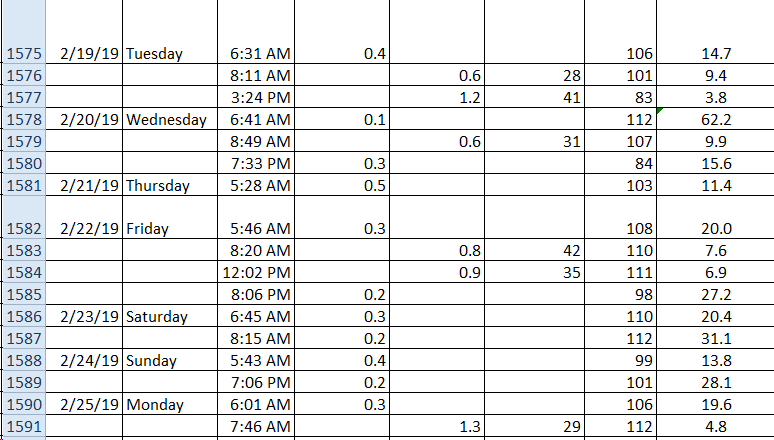Take a look at these results. I have almost 1,600 blood sugar and ketone samples. I’ve used urine strips (stopped years ago, as they no longer registered ketones), two different ketone meters, three different blood sugar testers (two pin prick, one continuous glucose monitor). I’m currently using Contour Next Ez blood sugar monitor and the KetoMojo ketone monitor and the ketonix breath ketone monitor. The columns are from left to right, number of rows, date, day, time, KetoMojo monitor at home, a different KetoMojo at work, ketonix (which I have only at work, blood sugar via a Contour Next Ez (one at work, one at home, but results only in one column), and the glucose-ketone index (GKI):
(The many other columns for the urine ketones or other blood sugar and ketone monitors are hidden.)
The problem is the ketones for the two different KetoMojos are all over the map. Look at Wednesday, 2/20: 0.1 at home and 0.6 at work? Then today, Monday, 2/25, 0.3 at home and 1.3 at work? What? These both were synced with the electronic device that comes with them, and both use the same strips. The last time this happened, I used their testing solution and wasted two strips and got exactly the same on both meters. Then I tested immediately thereafter using the same blood drops for new strips using the two meters and got completely different results.
The problem? I want to perform some scientific tests, where I eat more protein and less fat or less protein and more fat to see what happens to ketones. The current data I have indicates that higher fat = higher ketones, but I’ve never done a formal test with calorie counting. I can’t do that if I get this much error.
I realize there is error in every measuring device. 100% accurate for pin-prick blood monitors is plus or minus 15% of the real value. But to get 0.3 at home and 1.3 at work is ridiculous. And now I think all the other values I took at home are wrong, as I really had very few carbs yet my ketone readings were low.
Anyone have similar problems with the KetoMojo?
(And please don’t tell me not to test. I’m an engineer. I paid over $1,000 US to buy a continuous glucose monitor and testers in Sweden and have them shipped to me so that I could test Ted Naiman’s theory that higher protein was better. I found no blood sugar rise eating 120+ grams of protein per meal and have switched from higher fat to higher protein. I now find higher fat to be unpalatable. You’ll note the nearly 1,600 tests I have recorded. I like testing.)

